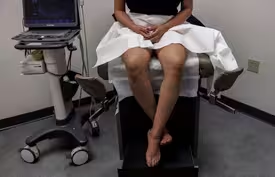
Demand for lithium batteries could harm U.S. water resources
Clip: 1/25/2024 | 9m 38sVideo has Closed Captions
How demand for lithium batteries could drain America's water resources
The push towards a green, battery-powered future comes with a major tradeoff. Student reporters from the Howard Center for Investigative Journalism at Arizona State University discovered that increased mining for lithium inside the United States will stress freshwater aquifers. Caitlin Thompson has their investigation.
Problems playing video? | Closed Captioning Feedback
Problems playing video? | Closed Captioning Feedback
Major corporate funding for the PBS News Hour is provided by BDO, BNSF, Consumer Cellular, American Cruise Lines, and Raymond James. Funding for the PBS NewsHour Weekend is provided by...

Demand for lithium batteries could harm U.S. water resources
Clip: 1/25/2024 | 9m 38sVideo has Closed Captions
The push towards a green, battery-powered future comes with a major tradeoff. Student reporters from the Howard Center for Investigative Journalism at Arizona State University discovered that increased mining for lithium inside the United States will stress freshwater aquifers. Caitlin Thompson has their investigation.
Problems playing video? | Closed Captioning Feedback
How to Watch PBS News Hour
PBS News Hour is available to stream on pbs.org and the free PBS App, available on iPhone, Apple TV, Android TV, Android smartphones, Amazon Fire TV, Amazon Fire Tablet, Roku, Samsung Smart TV, and Vizio.
Providing Support for PBS.org
Learn Moreabout PBS online sponsorshipAMNA NAWAZ: The push towards a green, battery-powered future comes with a major tradeoff.
More mining for lithium in the U.S. will stress a vital resource, water.
This story comes to us from the Howard Center for Investigative journalism at Arizona State University.
Caitlin Thompson has more.
CAITLIN THOMPSON: In the dry, desert landscape of Central Nevada, Nyle Pennington is checking groundwater levels outside America's only active lithium mine.
NYLE PENNINGTON, Hydrologist: The water goes in through the hole in the bottom, and when it just kisses that, then you read the tape.
That's how it's done.
CAITLIN THOMPSON: Pennington is a longtime water scientist who works for a Nevada water authority.
NYLE PENNINGTON: And since were here, I'm going to give it the old Nyle Pennington test.
CAITLIN THOMPSON: He drops a rock into a water monitoring station.
NYLE PENNINGTON: Bone-dry.
If that would have had water in it, you would have heard a pronounced, loud splash.
CAITLIN THOMPSON: This well typically held 30 feet of water.
For Pennington, the hollow sound is a warning bell about the impact from lithium mining.
The mine here needs billions of gallons of water every year, taking it from underground aquifers.
The mine's owner denies it is impacting freshwater aquifers, but Pennington says the evidence he found shows otherwise.
NYLE PENNINGTON: They're overdrafting down there, and it dried this well out.
CAITLIN THOMPSON: Not far away, Esmeralda County Commissioner De Winsor is also seeing a disturbing pattern.
DE WINSOR, Esmeralda County, Nevada, Commissioner: Yes, these out here have opened up a lot more since I have been around in just the last few years.
CAITLIN THOMPSON: Fissures and sinkholes have formed across the valley.
DE WINSOR: This one here has been opened up for quite a few years.
It's getting wider all the time.
CAITLIN THOMPSON: Winsor suspects lithium mining's thirst for water is altering the landscape.
DE WINSOR: A lady fell in there one year, her and her dogs.
CAITLIN THOMPSON: Pennington and Winsor are front-line observers of a new mining rush for lithium.
The mineral is critical for batteries that power everything from electric vehicles to power tools.
For now, China controls much of America's supply.
JOE BIDEN, President of the United States: And for some battery components, critical materials, China controls nearly half the global production.
But China's battery technology is not more innovative than anyone else's.
CAITLIN THOMPSON: The Biden administration is pushing for homegrown lithium production, for national security and green energy.
JOE BIDEN: Anyone want to jump in the back?
CAITLIN THOMPSON: Research by the Howard Center found opening new domestic mines will require billions of gallons of water.
The majority of new mines are proposed for the arid American West in areas prone to chronic droughts.
We found large-scale lithium production could soon stress water supplies in many states.
It's already happening in Nevada at Silver Peak, the country's only active lithium mine, operating since 1966.
And it's where Nyle Pennington has documented falling groundwater levels, like at this well that he says provided water for cattle.
NYLE PENNINGTON: My static water level was at 70 feet.
And it didn't take any time at all.
I mean, they have dried this well out in the course of a year.
CAITLIN THOMPSON: The Silver Peak mine is owned by Albemarle.
The American company is the world's largest producer of lithium, mainly from mines overseas.
Silver Peak is Albemarle's first U.S. mine.
We told Albemarle we wanted to ask about how the water authority identified groundwater wells running dry and how it believes the Silver Peak mine is playing a part.
The company provided the mine's operations manager, Scott Thibodeaux, who spoke to Howard Center reporter Jordan Gerard.
JORDAN GERARD, Howard Center for Investigative Journalism, Arizona State University: Those reports that their hydrologist submits to them blames lithium mining for -- quote -- "de-watering throughout Clayton Valley."
SCOTT THIBODEAUX, Operations Manager, Silver Peak Lithium Mine: I'm not familiar with the particulars.
I don't know that I can comment on that.
CAITLIN THOMPSON: Albemarle is permitted by the state for its water use.
And government records show, in 2020, Silver Peak pumped more than four billion gallons of salty, lithium-rich groundwater, plus hundreds of millions of gallons of freshwater to extract lithium.
And, since then, it's water usage has only grown.
The Central Nevada Regional Water Authority says all the pumping is making the groundwater dry up.
Its 2022 annual report says the drying of one monitoring well is due exclusively to de-watering throughout Clayton Valley for lithium mining purposes.
JEFF FONTAINE, Executive Director, Central Nevada Regional Water Authority: I think that the alarm bells have been rung.
CAITLIN THOMPSON: Jeff Fontaine is the executive director for the Central Nevada Regional Water Authority.
JEFF FONTAINE: I think there are a lot of people concerned about what's happening in Clayton Valley, but I don't know that there's agreement on what needs to be done.
CAITLIN THOMPSON: More lithium mines are coming.
Across the nation, we found more than 70 proposals already in the exploration or permitting phase.
The projects span nine states from California to North Carolina.
Just in Nevada, 28 lithium mines are trying to come online within 50 miles of the Silver Peak Mine, a potential economic boon for Nevada.
GOV.
JOE LOMBARDO (R-NV): Whether it's closing the lithium loop, unlocking innovation and investments in logistics, the message is that Nevada is ready to partner.
(APPLAUSE) CAITLIN THOMPSON: The Howard Center found, most of Nevada's proposed projects will rely on groundwater from basins that are already stressed.
GOV.
GAVIN NEWSOM (D-CA): We see this as one of the greatest economic opportunities of our lifetime.
And we want California to dominate in this space.
CAITLIN THOMPSON: California Governor Gavin Newsom is one of lithium's biggest cheerleaders.
GOV.
GAVIN NEWSOM: And that's the opportunity here anew.
This is it.
This is the Holy Grail.
CAITLIN THOMPSON: Here in the Salton Sea, carbon dioxide bubbles announce chemical reactions deep below ground.
The superheated liquid contains lithium from one of the biggest deposits in the world.
Planned extraction will require access to large amounts of freshwater from the Colorado River.
Its water supply is already stressed and suffering the impact of chronic drought, leaving states, Native American tribes, and industry fighting to access what's left.
JIM TURNER, President, Controlled Thermal Resources: There probably will be a lot of tension.
There already is.
CAITLIN THOMPSON: In January 2023, Jim Turner, president of Controlled Thermal Resources, spoke to the "NewsHour" about his lithium mining project.
JIM TURNER: We will take that lithium hydroxide and we will crystallize it with a certain type of equipment.
And we will get little crystals.
CAITLIN THOMPSON: Months later, the company disclosed just how much Colorado River water the project plans to take when it opens next year, almost two billion gallons of freshwater a year, or nearly 100 billion gallons over the mine'S life.
In a recent interview with the Howard Center, Turner broke the numbers down.
JIM TURNER: When you put it in terms of gallons, it does sound like a lot of water, and it is a lot of water.
CAITLIN THOMPSON: Turner says his company is considering alternative water sources.
He wants to use water left over from farming and ranching, which take the lion'S share of water from the Colorado River.
JIM TURNER: We're doing a lot of work on, can we take drain water, for example, after its gone through the agricultural world out here, can we use that water with some cleanup effort in our process?
CAITLIN THOMPSON: The Howard Center found the combined water needs of lithium mining in California could force neighboring states upriver like Nevada and Arizona to reduce water consumption in a future drought.
Arizona Congressman Raul Grijalva supports lithium mining, but says the 19th century law governing mining was written in an era when lawmakers didn't think about the impact on water supplies.
REP. RAUL GRIJALVA (D-AZ): And we're working with a regulatory framework based on 1872, a 150-year-old federal law, that basically is permissive, to the point of giving the mining industry almost unfettered right to utilize whatever water resources needed to extract.
CAITLIN THOMPSON: There are no federal laws governing how much water a mine can consume.
Grijalva is sponsoring new legislation to modernize the law.
So far, it has support only from fellow Democrats.
REP. RAUL GRIJALVA: I think it's critical to create a balance in order for us to be able to do this correctly.
Dealing with the crisis of climate does not mean that we create another environmental crisis by using water now that is becoming more and more precious every day.
CAITLIN THOMPSON: Back in Silver Peak, Albemarle says it's sticking to plans first announced in 2021 to increase pumping to 6.5 billion gallons of salty, lithium-rich water a year, right as more mines continue the push to come online.
For the "PBS NewsHour," I'm Caitlin Thompson at the Howard Center for Investigative Journalism at Arizona State university in Phoenix.
Border standoff intensifies as Texas governor defies ruling
Video has Closed Captions
Clip: 1/25/2024 | 5m | Border standoff between Texas, feds intensifies as governor defies Supreme Court ruling (5m)
How abortion restrictions affect thousands of rape victims
Video has Closed Captions
Clip: 1/25/2024 | 5m 49s | Study estimates 64,000 pregnancies from rape in states that enacted abortion bans post-Roe (5m 49s)
Mexico's foreign secretary on steps to ease border crisis
Video has Closed Captions
Clip: 1/25/2024 | 7m 44s | Mexico's foreign secretary discusses what her country is doing to ease border crisis (7m 44s)
News Wrap: Peter Navarro sentenced for contempt of Congress
Video has Closed Captions
Clip: 1/25/2024 | 5m 13s | News Wrap: Former Trump adviser Peter Navarro sentenced to prison for contempt of Congress (5m 13s)
Ohio becomes latest state to restrict gender-affirming care
Video has Closed Captions
Clip: 1/25/2024 | 5m 53s | Ohio becomes latest state to restrict gender-affirming care for minors (5m 53s)
Possible deal on Ukraine, immigration at risk of collapsing
Video has Closed Captions
Clip: 1/25/2024 | 4m 38s | Possible deal on Ukraine aid, immigration reform at risk of collapsing (4m 38s)
SaulPaul uses his music to inspire and empower young people
Video has Closed Captions
Clip: 1/25/2024 | 3m 39s | How SaulPaul is using his music to inspire and empower young people (3m 39s)
Trump takes the stand in federal defamation case
Video has Closed Captions
Clip: 1/25/2024 | 4m 43s | What happened in court when Trump took the stand in federal defamation case (4m 43s)
Providing Support for PBS.org
Learn Moreabout PBS online sponsorship
- News and Public Affairs

FRONTLINE is investigative journalism that questions, explains and changes our world.

- News and Public Affairs

Amanpour and Company features conversations with leaders and decision makers.












Support for PBS provided by:
Major corporate funding for the PBS News Hour is provided by BDO, BNSF, Consumer Cellular, American Cruise Lines, and Raymond James. Funding for the PBS NewsHour Weekend is provided by...







